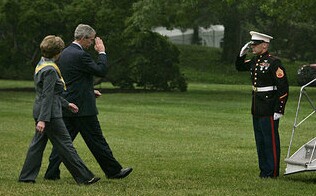


|

|
|
|
Home |
The Mil & Aero Blog
 Posted by John Keller The U.S. Department of Defense (DOD) has released its budget request for next year, fiscal 2009, and it looks to be a safe budget for President Bush's last year in office. We'll have a new president by the time the next DOD budget request comes out, Bush looks like he has left any hard decisions up to the next chief executive. There's not a lot that stands out in the DOD's latest budget. Generally it would keep the money faucets turned on at stable levels across the board. Nothing major seems to be cut, and nothing major seems to have a substantial increase. In other words, steady as she goes. Let the next commander-in-chief make the tough choices. There could have been big changes, but that wasn't likely in an election year. The Joint Strike Fighter program continues on course, even though some experts point out that this multi-billion-dollar program would make a juicy target for reducing spending. Other programs that have received close scrutiny and much criticism in recent months -- the Transformational Satellite Communications System (TSAT), the Navy's Littoral Combat Ship, the Joint Tactical Radio System, and ballistic missile defense -- all would receive predictable funding levels in this budget. Just as this budget request contains few, if any, surprises, I'll bet we'll see more of the same routine on Capitol Hill this spring as Congress discusses whether to grant the Pentagon's proposed spending. It's an election year, after all, and no one wants to be singled out as a big enemy of defense spending. If big cuts are going to happen, we might see them next year or the year after. For now, it's status quo. It's shaping up that it doesn't matter if members of Congress are Democrats, Republicans, liberals, or conservatives. No one seems very interested in cutting defense spending in a substantial way. I predicted that the 2008 defense budget would face tough sledding in Congress this past year, but I was wrong. Lawmakers approved the budget essentially as submitted with little fanfare. I think we'll see the same in coming years. Members of Congress don't want to be seen as anti-military, and the next president won't, either. If the next president is John McCain, he's making the war on terror the centerpiece of his campaign, so spending would seem safe with him. If the next president is Barack Obama or Hillary Clinton, that person will be under intense pressure to appear tough in international relations. Military spending would appear safe there, too. I don't think there is a lot to worry about if you're involved in the defense business. Some experts even predict that defense spending could help prop up the economy as the retail and housing sectors soften. We'll see how things unfold. 0 Comments:
<< Home |
Welcome to the lighter side of Military & Aerospace Electronics. This is where our staff recount tales of the strange, the weird, and the otherwise offbeat. We could put news here, but we have the rest of our Website for that. Enjoy our scribblings, and feel free to add your own opinions. You might also get to know us in the process. Proceed at your own risk. 
John Keller is editor-in-chief of Military & Aerospace Electronics magazine, which provides extensive coverage and analysis of enabling electronic and optoelectronic technologies in military, space, and commercial aviation applications. A member of the Military & Aerospace Electronics staff since the magazine's founding in 1989, Mr. Keller took over as chief editor in 1995.  Courtney E. Howard is senior editor of Military & Aerospace Electronics magazine. She is responsible for writing news stories and feature articles for the print publication, as well as composing daily news for the magazine's Website and assembling the weekly electronic newsletter. Her features have appeared in such high-tech trade publications as Military & Aerospace Electronics, Computer Graphics World, Electronic Publishing, Small Times, and The Audio Amateur.
Courtney E. Howard is senior editor of Military & Aerospace Electronics magazine. She is responsible for writing news stories and feature articles for the print publication, as well as composing daily news for the magazine's Website and assembling the weekly electronic newsletter. Her features have appeared in such high-tech trade publications as Military & Aerospace Electronics, Computer Graphics World, Electronic Publishing, Small Times, and The Audio Amateur.
 John McHale is executive editor of Military & Aerospace Electronics magazine, where he has been covering the defense Industry for more than dozen years. During that time he also led PennWell's launches of magazines and shows on homeland security and a defense publication and website in Europe. Mr. McHale has served as chairman of the Military & Aerospace Electronics Forum and its Advisory Council since 2004. He lives in Boston with his golf clubs.
John McHale is executive editor of Military & Aerospace Electronics magazine, where he has been covering the defense Industry for more than dozen years. During that time he also led PennWell's launches of magazines and shows on homeland security and a defense publication and website in Europe. Mr. McHale has served as chairman of the Military & Aerospace Electronics Forum and its Advisory Council since 2004. He lives in Boston with his golf clubs.
Previous Posts
Archives
|
|||||
Internet gems
THE MAE WEBSITE AUTHORS ARE SOLELY RESPONSIBLE FOR THE CONTENT AND ACCURACY OF THEIR BLOGS, INCLUDING ANY OPINIONS THEY EXPRESS, AND PENNWELL IS NOT RESPONSIBLE FOR AND HEREBY DISCLAIMS ANY AND ALL LIABILITY FOR THE CONTENT, ITS ACCURACY, AND OPINIONS THAT MAY BE CONTAINED HEREIN. THE CONTENT ON THE MAE WEBSITE MAY BE DATED AND PENNWELL IS UNDER NO OBLIGATION TO PROVIDE UPDATES TO THE INFORMATION INCLUDED HEREIN.
|
||||||
|
|
Home | About Us | Contact Us | Corporate Website | Privacy Policy | Courage and Valor Foundation | Site Map
Also Visit: Laser Focus World | Vision Systems Design | Industrial Laser Solutions Copyright © 2007: PennWell Corporation, Tulsa, OK; All Rights Reserved. | Terms & Conditions | Webmaster |